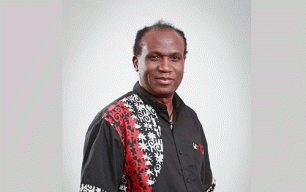Oshikango cheers Shikongo’s stand against corrupt border police

Residents and street vendors in the border town of Oshikango have commended Namibian Police Chief, Lieutenant General Joseph Shikongo for his public condemnation of corrupt border police officers.
These officers have been accused of confiscating vendors’ merchandise, including essential food items, for personal gain and soliciting bribes from individuals whose goods are seized.
During a community meeting last Saturday, attended by high-ranking regional police officials such as Ohangwena Regional Commander Commissioner Ottilie Kashuupulwa, Shikongo voiced his strong disapproval of these illicit activities. He specifically addressed the practice of officers confiscating and reselling food intended for the public, as well as the broader issue of bribery, emphasizing the damage such actions inflict on the national police’s reputation. “Those who will be found guilty of these crimes will be decisively dealt with,” he sternly warned.
The Inspector General further revealed the recent arrest of two officers stationed at the Oshikango police station on corruption charges. “One of them was arrested for accepting an amount of N$100 from an inmate as a bribe to smuggle in a cellphone,” he stated, emphasizing the immediate apprehension of the implicated officer.
Shikongo detailed another incident involving an officer who confiscated illegal Angolan fuel from vendors with the intention of reselling it for personal profit, leading to the officer’s arrest.
In a significant directive, the police chief explicitly instructed officers along the border against confiscating food items purchased by Namibians in Angola for resale. “Most of these people are just trying to make a living and we are pushing them further. I am not saying people should be allowed to do what they want, but confiscating food items is just too harsh,” he noted, urging officers to prioritize the maintenance of law and order with compassion.
The residents and street vendors present at the meeting warmly welcomed Shikongo’s reprimand, highlighting their long-standing grievances. They recounted numerous instances where their goods, including food, clothing, and other merchandise sourced from Angola for resale in Namibia, were unjustly confiscated by the police. They alleged that these items rarely reached the police station, often ending up in the possession of the officers themselves.
Immanuel Ngesheya, a street vendor trading in Angolan food items like biscuits, macaroni, sugar, tinned fish, and maize meal, shared his personal experiences of having his merchandise confiscated. He expressed his gratitude to Shikongo for addressing their plight. “I specifically went to that meeting to hear what Shikongo was going to say regarding our predicament. We have been suffering at the hand of those officers and we had nowhere to go. Your things are confiscated, you go to the police station to look for them and you don’t find them. All what they do is to chase you away and threaten to arrest you,” he lamented, adding that Shikongo encouraged them to report any future instances of such corruption.
Johanna Markus, another vendor who purchases goat heads, trotters, and animals hides from Ondjiva in Angola, also voiced her satisfaction with Shikongo’s stance against confiscations. She recounted multiple instances where her stock was seized at her trading location. “They always say the goods were obtained illegally, but they just want push us into poverty. I have kapana sellers who come from as far as Omuthiya and Oshakati to buy in bulk from me because they don’t know Angola very well. So, I go buy in bulk in Ondjiva and come resell to them here. Business should go like that. Why is only Namibian officers who have a problem with us but not the Angola police?” she questioned.
While acknowledging and respecting the Inspector General’s directive regarding food confiscations, Ohangwena police spokesperson Warrant Officer Andreas Nghiyolwa emphasized that the police in the region, particularly those stationed along the border, would remain vigilant to prevent the exploitation of this directive for the smuggling of contraband such as fuel, cigarettes, and cheap whisky.
- 366 views










Comments